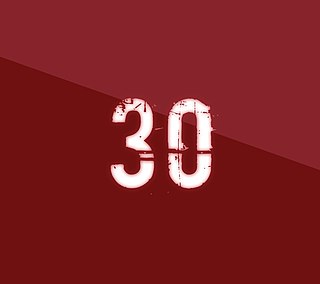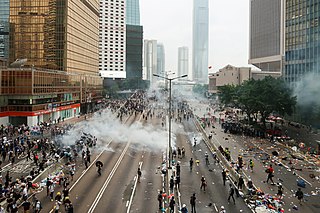 W
WThe 30th anniversary of Tiananmen Square protests of 1989 was principally events that occurred in China and elsewhere on and leading up to 4 June 2019 – to commemorate the Chinese Communist Party's crackdown on the Tiananmen Square protests of 1989 in which hundreds of people were killed.
 W
WIntense confrontation between anti-extradition bill protesters and the Hong Kong Police Force occurred on 12 June 2019 outside the Government Headquarters in Admiralty, Hong Kong Island. The protest was sparked by the government's introduction of the controversial Fugitive Offenders amendment bill, which was set to go through second reading on 12 June despite mass opposition.
 W
WThe Fugitive Offenders and Mutual Legal Assistance in Criminal Matters Legislation (Amendment) Bill 2019 was a proposed bill regarding extradition to amend the Fugitive Offenders Ordinance in relation to special surrender arrangements and the Mutual Legal Assistance in Criminal Matters Ordinance so that arrangements for mutual legal assistance can be made between Hong Kong and any place outside Hong Kong. The bill was proposed by the Hong Kong government in February 2019 to establish a mechanism for transfers of fugitives not only for Taiwan, but also for Mainland China and Macau, which are currently excluded in the existing laws.
 W
WThe 2019 Hong Kong District Council elections were held on 24 November 2019 for all 18 District Councils of Hong Kong. 452 seats from all directly elected constituencies, out of the 479 seats in total, were contested. Nearly three million people voted, equivalent to 71 per cent of registered voters, an unprecedented turnout in the electoral history of Hong Kong. The election was widely viewed as a de facto referendum on the ongoing pro-democracy protests.
 W
WThe ongoing 2019–20 Hong Kong protests, also known as Anti-Extradition Law Amendment Bill Movement, were triggered by the introduction of the Fugitive Offenders amendment bill by the Hong Kong government. The now aborted bill would have allowed extradition to jurisdictions with which Hong Kong did not have extradition agreements, including mainland China and Taiwan. This led to concerns that Hong Kong residents and visitors would be exposed to the legal system of mainland China, thereby undermining Hong Kong's autonomy and infringing civil liberties. It set off a chain of protest actions that began with a sit-in at the government headquarters on 15 March 2019, a demonstration attended by hundreds of thousands on 9 June 2019, followed by a gathering outside the Legislative Council Complex to stall the bill's second reading on 12 June which escalated into violence that caught the world's attention.
 W
WThe death of Chan Yin-lam, a 15-year-old student, occurred on or shortly after 19 September 2019. Her naked corpse was found floating in the sea near Yau Tong, Hong Kong on 22 September 2019. Following a preliminary autopsy, police asserted that no foul play was suspected and that Chan had killed herself, while some protesters spread conspiracy theories alleging she was murdered by Hong Kong authorities in connection with her participation in the 2019 Hong Kong protests. The coroner's inquest concluded with the jury unanimously returning an open verdict, as the cause of death could not be determined, after Magistrate Ko Wai-hung ruled out both homicide and suicide as possible causes due to insufficient evidence to support this.
 W
WLuo Changqing, a 70-year-old government-contracted cleaner, died from head injuries sustained after he was hit by a brick thrown by a protester during a violent confrontation between two groups in Sheung Shui, Hong Kong on 13 November 2019. Following his injury, he was taken to Prince of Wales Hospital, Sha Tin, where he died the next day. This incident was described as the first fatality directly attributed to the Hong Kong protests that began in 2019.
 W
WThe Emergency Regulations Ordinance is a law of Hong Kong that confers on the Chief Executive in Council the power to make regulations on occasions that the Chief Executive believes to be an emergency or public danger. It was first introduced in Colonial Hong Kong in 1922 to combat the seamen's strikes which had immobilised the city's ports, and was invoked on several occasions during the colonial rule.
 W
WThe 38th Hong Kong Film Awards presentation ceremony took place at the Hong Kong Cultural Centre on 14 April 2019.
 W
WThe Hong Kong Way was a peaceful political campaign held in Hong Kong on 23 August 2019, the 30th anniversary of the Baltic Way. The goal was to draw people's attention to the 2019 anti-extradition bill movement and the protesters' five demands for government accountability and democratic reform. Organisers estimated that 210,000 people participated. In the early night time hours, Hongkongers joined hands to create a human chain of 50 kilometres long on both sides of Victoria Harbour, along the three main MTR lines and over the top of Lion Rock, without any disruptions to traffic.
 W
WThe conduct of the Hong Kong Police Force is a subject of controversy during the 2019–20 Hong Kong protests. Tactics employed by the force have led to misconduct allegations and protesters have accused the Hong Kong government of using the police as a method to resolve a "lingering political crisis." Actions taken by the police force and the Hong Kong government have caused mixed reactions inside Hong Kong and in the general international community. Allegations against the police include excessive use of force, force against unspecific targets, and arrest without warrant. These allegations have been presented in various media both supporting and detracting from the complaints, such as through amateur video. In general, the spirit, rumors, videos, and other media shared by the public have caused a drop in support for the police force, and an Amnesty International report accused the police of using excessive force against civilians. One of the objectives of the 2019–20 protests is establishment of an independent inquiry system into said allegations.
 W
WThe Storming of Legislative Council refers to the siege, break-in, and subsequent occupation of the Legislative Council Complex in Hong Kong by anti-government activists on 1 July 2019 during the campaign to halt the enactment of the Fugitive Offenders amendment bill. Hundreds of protesters broke through the glass walls and metal doors and entered the building, ransacked and vandalised the interior with anti-government and anti-PRC slogans. It is considered a watershed event in the 2019–20 Hong Kong protests. Nine days later, on 9 July, the Chief Executive, Carrie Lam, announced that the extradition bill was "dead".
 W
WThe month of November 2019 in the 2019–20 Hong Kong protests started with protesting in malls and police getting into homes and malls to arrest protesters. The death of Chow Tsz-lok in Sheung Tak, Tseung Kwan O had led to more protests. In mid November, there were city-wide strikes which lasted for more than a week. Hong Kong Police officers fired tear gas in CUHK, PolyU, and nearby areas. In late November, the District Council elections were held. The pro-democracy camp in conjunction with the localist groups got more than 80 per cent of the seats and gained control of 17 out of 18 District Councils.
 W
WThe month of August 2019 in the 2019–20 Hong Kong protests saw a continuation of protests throughout the city. Several of the peaceful daytime protests were held by social groups such as families, the elderly, and various professions. In many instances, peaceful protests occurs during the day, turning increasingly violent at night. In some instances, white-shirted armed groups were attacking protesters and even passersby caught up in the conflict, although not at the scale of the Yuen Long violence of 21 July. Protesters aimed at drawing international attention through methods such as extended sit-ins at the airport. In many occasions, an eye injury of a female protester who had served as frontline medical staff became an symbol of the protests. At the airport protests, a mainland journalist was violently tackled by protesters who did not revealed his identity to the protesters. Protesters later apologised for this incident, reducing tensions and satifying some pro-establishment lawmakers. Heavy-handed police tactics, which included the first use of water cannons and live warning shots caused further controversy, fueling further protests throughout the city.
 W
WAfter the rapid deterioration of the overall situation in the city in the course of the previous months of the 2019–20 Hong Kong protests, a degree of calming of the protests occurred in December 2019. This was due to several factors. One was an initial expectation of the protesters and their supporters that the government would finally offer concessions on the Five Demands – apart from the withdrawn extradition bill – after the resounding defeat of the pro-establishment camp in the District Council Elections on 24 November, which had dealt a blow to government rhetoric about its public support. The mass protests on 8 December were largely an expression of dissatisfaction that these concessions had not been forthcoming. Another factor seen as responsible for the decrease in the size of the protests was that the arrests during the Siege of Polytechnic University had thinned the ranks of the protesters.
 W
WThis segment of the timeline of the 2019–20 Hong Kong protests covers the month of July 2019. The anniversary of the 1997 handover of Hong Kong to China on 1 July saw large daytime protests. In the evening of that day, protesters stormed the Legislative Council Building and defaced symbols, with police only moving in after midnight. This incident, which was sharply condemned by the government of Carrie Lam, did however not lead to a split between peaceful and violent protesters. Observers linked the understanding of the non-violent protesters for the violent wing to the lack of willingness of the Lam government to engage in dialogue about the protesters' five demands. Apart from major protests on Sundays, there were also mostly peaceful demonstrations during the week.
 W
WThe period from March to June 2019 in the 2019–20 Hong Kong protests is considered the early stage of the movement. Until the first mass demonstrations in June, protests were focused on the withdrawal of the extradition bill. In June, protesters started to lay out five demands. The additional four demands concerned the reactions of the Hong Kong government and especially, the police to the protests, and called more broadly for full democracy in the city.
 W
WIn October 2019, the 2019–20 Hong Kong protests saw a further escalation of violence. It became evident that the protests were unlikely to end soon, and that they posed the biggest popular challenge to Chinese Communist Party (CCP) leader Xi Jinping since his ascension to CCP general secretary in 2012. In order to bring the situation under control, Chief Executive Carrie Lam invoked colonial-era powers to impose an anti-mask law, aimed at preventing protesters from hiding their identity. Observers considered the law, which came into force on 4 October, as a precedent for possible wider use of emergency powers at the expense of citizens' freedoms and in addition democratic rights, as they even saw the possibility of the upcoming District Council elections being cancelled based on the emergency law. The mask ban did, however, not achieve the desired effect, but rather proved a further focal point of protests. In November, the High Court ruled the mask ban to be unconstitutional, although in April 2020, an Appeal Court ruled that it was constitutional in the case of unlawful assemblies.
 W
WThe month of September in the 2019–20 Hong Kong protests saw again citywide unrest. Chief Executive Carrie Lam announced on 4 September that the extradition bill, in suspension since July, would be fully withdrawn, which fulfilled one of the five demands of the protesters. Also, following an earlier promise, Lam held a discussion session with randomly selected members of the public on 26 September. These acts, however, had little to no effect on the protests, as protesters insisted that all of the five demands be met. That this latter goal would be hard, if not impossible, to achieve – due to the very limited room given to Lam's administration by mainland Chinese authorities, as transpired from comments by officials – did not discourage the protesters from continuing to take to the streets.
 W
WOn the evening of 21 July 2019, during the 2019–20 Hong Kong protests, a mob attack occurred in Yuen Long, a town in the New Territories. An armed mob of alleged triad members dressed in white indiscriminately attacked civilians on streets with steel rods and rattan canes, before attacking passengers in nearby Yuen Long station including the elderly, children, black-clad protesters, journalists and lawmakers. At least 45 people were injured in the incident, including a pregnant woman. The attack happened following an anti-extradition bill protest earlier that day in Sheung Wan, a district on Hong Kong Island.